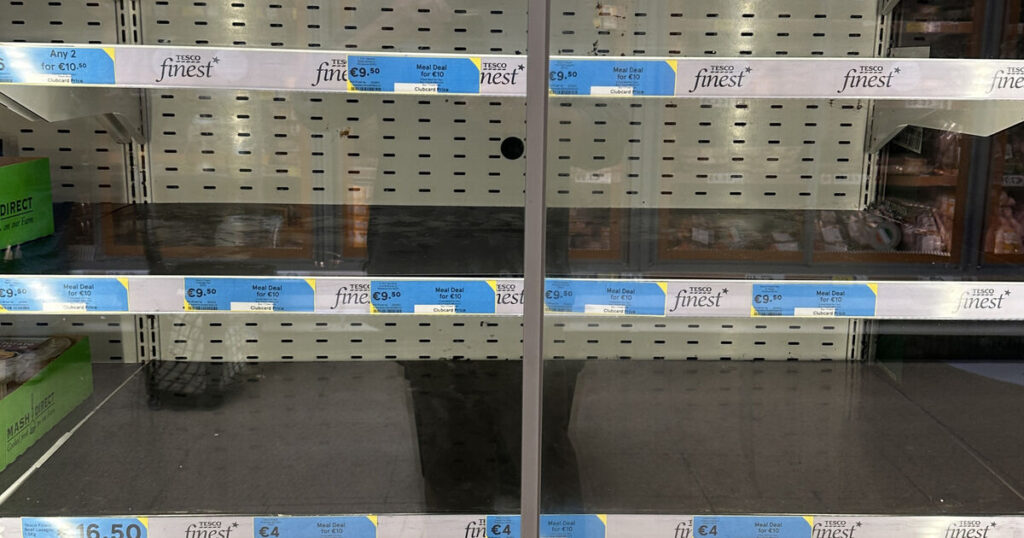An adult has died with a confirmed case of the rare bacterial infection listeriosis after a massive recall of ready-made meals earlier this week.
Health officials are investigating an “extensive outbreak” linked to the recall of supermarket ready meals, which were sold at retailers including Tesco, SuperValu, Aldi and Centra.
Nine cases have so far been linked to the outbreak, which prompted concerns over more than 140 ready meal products sold across the country.
Affected meals include pasta bakes, curries, turkey and ham dinners, pasta bolognese and beef stroganoff. The FSAI issued the recall notice this week on branded ready-made meals and side dishes produced by the Dublin-based Ballymaguire Foods due to the possible presence of listeria monocytogenes.
The full list of implicated products can be found here.
But what is listeriosis? Here’s what you need to know.
Listeriosis, also known as listeria, is an infection caused by the bacterium Listeria monocytogenes.
According to the HSE’s Health Protection Surveillance Centre (HPSC), it is usually acquired by eating food contaminated with this bacterium.
Listeriosis is a notifiable disease in Ireland. This means medical practitioners are required to notify health officials when there is a case of listeriosis. The notification of case is used to investigate and to prevent the spread of infection and further cases.
Infection occurs mainly through eating contaminated food. The incubation period ranges between three and 70 days, but the average incubation period is three weeks.
If a woman eats contaminated food during pregnancy, the infection can also be passed across the placenta to the baby.
Anyone can become ill from eating food contaminated with Listeria monocytogenes, although the disease affects primarily the following groups of people:
- Pregnant women and their unborn children
- Newborns
- Adults with weakened immune systems
- The elderly
Listeriosis is widespread in the environment and can be found in soil and water.
The HPSC says vegetables “can become contaminated from the soil or from manure used as fertilizer”.
“Animals can carry the bacterium without appearing ill, and meat or dairy products from these animals can be contaminated.”
Some foods, such as cheese, may also be contaminated after processing.
The HPSC says the foods most often associated with infection are ready-to-eat refrigerated and processed foods.
These include: pre-prepared cooked and chilled meals, soft cheeses, cold cuts of meat, pâtés and smoked fish.
Increasingly, outbreaks of listeriosis associated with fresh produce (particularly fresh vegetables that undergo little or no heat treatment) are being reported, the HPSC says.
Listeriosis in a healthy adult can cause a mild flu-like illness.
However, in immunocompromised and elderly individuals, it can occasionally spread to the central nervous system and cause meningitis and/or septicaemia. Symptoms such as headache, stiff neck, confusion, and loss of balance or convulsions may also occur.
Infected pregnant women may have no symptoms or experience only a mild flu-like illness. But infection during pregnancy can lead to premature labour, meningitis in the newborn, or even miscarriage.
Diagnosis is usually made via a blood test.
During pregnancy, a blood test is the most reliable way to find out if symptoms are due to listeriosis.
Listeriosis can be treated with antibiotics. However, even with treatment, infection can be severe and may result in death, especially in the elderly.
The HPSC says protecting yourself against listeriosis is particularly important for those who are most at risk: pregnant women, infants, the elderly and those with weakened immune systems.
It has listed a host of measures that will help to reduce your risk of infection:
- Keep foods for as short a time as possible and follow storage instructions including ‘use by’ and ‘eat by’ dates;
- Cook food thoroughly, especially meat, ensuring that it is cooked through to the middle;
- Keep uncooked meats separate from vegetables and from cooked and ready-to-eat foods;
- Wash salads, fruit and raw vegetables thoroughly before eating, or peel if appropriate;
- Wash hands, knives, and cutting boards after contact with uncooked food;
- Make sure that the refrigerator is working correctly;
- When heating food in a microwave, follow heating and standing times recommended by the manufacturer;
- Throw away left-over reheated food. Cooked food which is not eaten immediately should be cooled as rapidly as possible and then stored in the refrigerator;
- Pregnant women, the elderly, and people with weakened immune systems should avoid eating high-risk foods such as: raw (unpasteurised) milk or foods made from raw milk, soft or mould-ripened cheeses (e.g. feta, Brie, Camembert, blue-veined cheeses), pâté and smoked salmon;
- If contact with ewes at lambing time is unavoidable for pregnant women, the elderly, or people with weakened immune systems, washing of hands after handling animals should reduce any possibility of infection.
The content is rewritten simply by correcting some spacing issues to ensure that the HTML formatting aligns with common practices to improve readability, without any change to the meaning.
News Source : Irish Examiner


